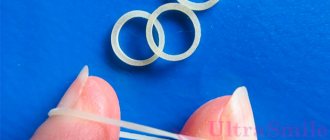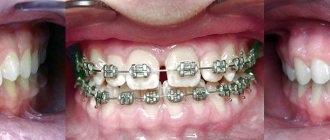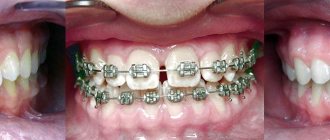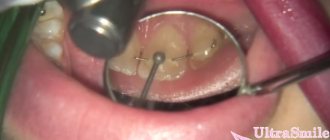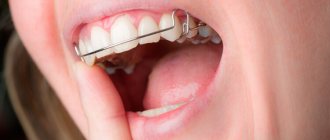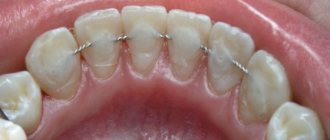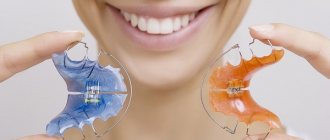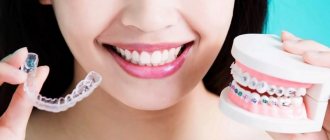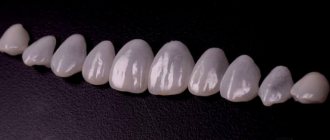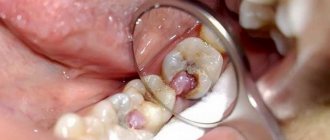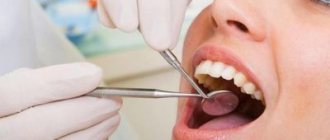July 15, 2021
In the process of correcting malocclusion with braces, some patients require additional elements to be installed on their teeth. Most often, elastics are fixed, which do not look as attractive and unnoticeable as we would like. Plus, some admit that with rubber bands they have to go through a new series of unpleasant sensations. What is this? How long? What are the features of installation and operation? What should you pay attention to? We'll talk about this in an article on the UltraSmile.ru portal.
What are elastics
Elastics, or as they are also called, rods for braces, are auxiliary devices, the purpose of which is to increase the impact on a specific tooth or group of teeth, to align the elements of the upper and lower jaw relative to each other. And thereby achieve an ideal result not only aesthetically, but also functionally. They look like ordinary small round rubber bands. Can be colored or transparent. Made from durable yet highly stretchable surgical latex.
Elastics are small round rubber bands made from durable but highly stretchable surgical latex.
It is important to understand that pulls are not the same as ligatures, although they are similar in appearance. The second, that is, ligatures, are an integral part of the ligature bracket system, where a metal power arc is attached to the grooves using ligatures (small rubber bands). They must be worn throughout the entire treatment period, and the doctor changes them every 2-4 weeks. But with elastic cords for braces, the situation is somewhat different.
Color palette
Today, to install such a device there are no restrictions on the choice of shade. Everything will depend only on the wishes of the patient and the capabilities of the clinic.
Most dentists can offer their clients ligatures in a standard color range : yellow, red, pink, blue, green, white. Some clinics have in their arsenal more extensive color ranges, including ligatures of more than 20 shades.
In VIP dental centers, colored braces will be divided into several groups : for boys, men, girls and women. Each group can include more than 10 shades of each color, made in warm and cool tones.
Read what is called aesthetic ligature braces in a separate publication.
In this article we will talk about how to remove cracks between teeth.
At the link https://orto-info.ru/sistemyi-vyiravnivaniya-zubov/breketyi/po-tipu-materiala/metallicheskie/raznovidnosti-i-foto.html you will find photos of various models of metal ligature braces.
Indications for installation
- the presence of impacted teeth and the need to pull them into the dentition after freeing up additional space in the jaw,
- the need to align the jaws relative to each other or pull the upper jaw towards the lower so that they close normally (for example, with an open bite),
- the presence of a tooth protruding from the row: then it needs to be displaced,
- single interdental spaces, lack of contact between row elements.
Elastics have a constant impact on an individual tooth or group of teeth and, in fact, perform the same function as a power arc, but only more precisely and purposefully.
Elastics have a permanent effect on an individual tooth or group of teeth.
Purpose of rubber bands for braces
Orthodontic traction is needed so that the entire structure helps move the teeth in the desired direction. It consists of elastic rings fixed to braces and connected to each other with clasps. They can have different thicknesses and diameters. These structural components are made smooth, thereby eliminating the risk of burrs, cracks, chips, and other damage appearing on them.
Elastic bands on braces are used to control the movement of teeth, due to which the dentition becomes straight and the bite is corrected. They create additional force, so defects are eliminated faster.
Types of traction
Today, braces manufacturers create elastics that differ in the following characteristics:
- elasticity, hardness: weak, medium, medium-strong, strong, super strong,
- length: short ones connect small areas, long ones connect groups of teeth,
- extraoral and intraoral: the former are used to treat mesial occlusion in combination with a facebow, the latter are used specifically for aligning elements in the oral cavity (most often they are what we are talking about).
To make it easier for doctors, and subsequently patients, to navigate the varieties, manufacturers produce rods in packages with the names of different animals or countries. Thus, the well-known company Ormco, which creates braces of the Damon series, produces a series of intermaxillary rods “Zoo”, where there are sets of “beaver”, “bull”, “camel”, “giraffe”, “penguin”, “ostrich” and others .
Damon series braces
Alternative to colored rubber bands
Doctors often camouflage the metal archwire by using colored wire to help make the staples themselves attractive. The wire can be created from steel or silver, titanium or aluminum. It is more wear-resistant and lasts longer compared to ligatures. However, it has one significant drawback - under the influence of drinks and food consumed, temperature changes, its outer layer can crack, which will look unaesthetic. Therefore, orthodontists still often advise choosing braces with ligatures.
How to secure the rods
Initially, the installation of rods for braces is carried out by an orthodontist. He carefully threads them into special hooks located on the plates of the bracket systems. However, elastics can be fixed in the oral cavity in different ways:
- V-shaped: the elastic band is tightened on two teeth of one jaw and one element of a row of the other jaw. As a rule, it solves the issue of moving one unit, or helps to give two units a normal location relative to each other,
- box-shaped: after installation, the elastic takes on a square or rectangular shape. Responsible for moving and aligning an entire group of row elements.
Regardless of the installation method, elastics are always fixed on both jaws at once. Their location can be different: for example, they can connect the lower “sixes” and the upper “twos” or “fours”. In this case, a certain symmetry is always maintained due to the same tension force, which allows the load to be evenly distributed. Therefore, if one rubber band suddenly breaks, for example, on the right, then it is necessary to replace both rods.
After installation, the doctor must give you a special tool with a hook on the end and a “slingshot” on the other side, as well as a diagram of how to properly fix the elastic bands. After all, the patient will subsequently have to independently remove and put on the braces.
Wearing rules for patients
While wearing an orthodontic structure, patients are prohibited from eating solid foods (nuts, crackers, hard fruits, etc.). This leads to wear and damage to the rubber bands.
The elastics are permanently attached to the structure and can be removed while brushing your teeth. Metal braces or ceramic - it doesn't matter.
It is forbidden to loosen the tension of the rubber bands on your own.
At home you need to have an additional set of elastics.
If the tension is severely weakened, be sure to visit an orthodontist. The doctor will select a different type of traction.
How long to wear, when to take off
Depending on the period of operation, everything is very individual. Some patients wear elastics for 1-2 months, others for 4-6 months. But there are also those who go with them for more than six months.
The wearing pattern is also determined individually. At first, some people need to remove braces only when eating and for oral hygiene. Others wear them mainly at night, or for 12-16 hours a day.
“Oh, my elastics were installed in a zigzag pattern on the right and left. When it was first installed, I felt terrible pressure, especially at night. It even seemed as if the teeth were grinding, they were pulled together so tightly. And then I didn’t notice how I got used to it. The elastic bands stretch very quickly, and then you don’t even notice! I even tried to eat in them later, but I don’t recommend it to others, it could cause them to burst...” Masyanya, review from the forum breketi.3bb.ru
The pattern of wearing elastics is determined individually
Prices
The cost of rubber bands is initially taken into account when prescribing orthodontic treatment. But the rubber bands have to be changed periodically, because they wear out and stretch, and may break. It is advisable to always have them with you.
But since elastics are consumables, their prices are low. They can be purchased at a dental clinic - the price will be highest there.
The pharmacy sells them at a lower cost. The cheapest place to buy rubber bands is in online stores. The average cost is from 60 to 150 rubles. for 100 pieces.
To learn how to put on orthodontic elastics, watch the video.
What inconveniences should you prepare yourself for?
You won't be able to chew food while wearing elastics, so you'll have to take them off for snacks. Moreover, if they are installed correctly, the patient usually does not have serious problems opening his mouth when speaking. But at first, many people, of course, feel discomfort from the new state of things in the mouth, soreness, and tightness.
Some patients admit: at first it seems that in this form and with their jaws pulled together it will be impossible to go to work, communicate with colleagues and friends. But in reality everything is different. Most quickly get used to it and feel quite at ease.
The rods for braces have one feature - they stretch quickly and therefore can fly off. Sometimes they also tear. So that they fully perform their function, and you “suffer” for good reason, be sure to change them. Doctors usually recommend replacing 2 times a day, morning and evening. Therefore, you need to always have a set of rubber bands at home. But there are usually no problems with stocks, because elastics are sold in sets of 100 pieces and are quite inexpensive.
You should not increase or decrease the number of elastic bands. There is no need to attach them to other areas unless prescribed by the orthodontist. Strictly follow all recommendations prescribed by your doctor, do not despair at the initial stage of possible discomfort and do not relieve cravings. And then a positive result will not be long in coming.
Notice
: Undefined variable: post_id in
/home/c/ch75405/public_html/wp-content/themes/UltraSmile/single-item.php
on line
45 Notice
: Undefined variable: full in
/home/c/ch75405/public_html/wp-content /themes/UltraSmile/single-item.php
on line
46
Rate this article:
( 2 ratings, average: 5.00 out of 5)
- According to the official website ormco.ru
Expert “In terms of size, the elastics seem very small, and in terms of elasticity, they seem too elastic. And many patients are perplexed about how they will put traction on braces. However, in reality, everyone eventually learns this too. A couple of attempts in front of the mirror, and then the desired skill appears, and the rubber bands are fixed in literally 2-3 minutes. A special tool helps a lot in quick fixation.” Orthodontist Vagapov Zakir Irkinovich
Consulting specialist
Vagapov Zakir Irkinovich
Doctor rating: 7 out of 10 (3) Specialization: Orthodontist Experience: 16 years
Features and advantages of rubber bands for braces
These parts are as follows:
- Orthodontic traction does not come into contact with the gums, therefore eliminating the risk of irritation, chafing, and injury;
- Despite the fact that the elastic bands on braces tighten the teeth, firmly connecting the jaws, they do not interfere with their free movement and comfort in the oral cavity when talking or eating;
- In most cases, the patient very quickly gets used to the entire structure, including the orthodontic traction.
Rubber bands for braces should be installed by a specialist who has experience in this process. It is important that they are fixed so that the tension force is even on both sides. Only when this condition is met, comfortable wearing of the structures, efficiency and speed of their impact are ensured.
The cost of bright solutions
How much do colored braces cost? Their cost exceeds the cost of metal ones, but much less than sapphire and ceramic ones. Treatment of malocclusion using metal devices will cost the patient from 25,000 rubles, which depends on the complexity of the case. Plastic structures cost from 30,000 rubles. When using ligatures of unusual shape, the price will increase. For colored ceramic braces, the price will already be quite high: 70,000-120,000 rubles. Designs made from artificial sapphires are even more expensive, on average 12,000 and above.
